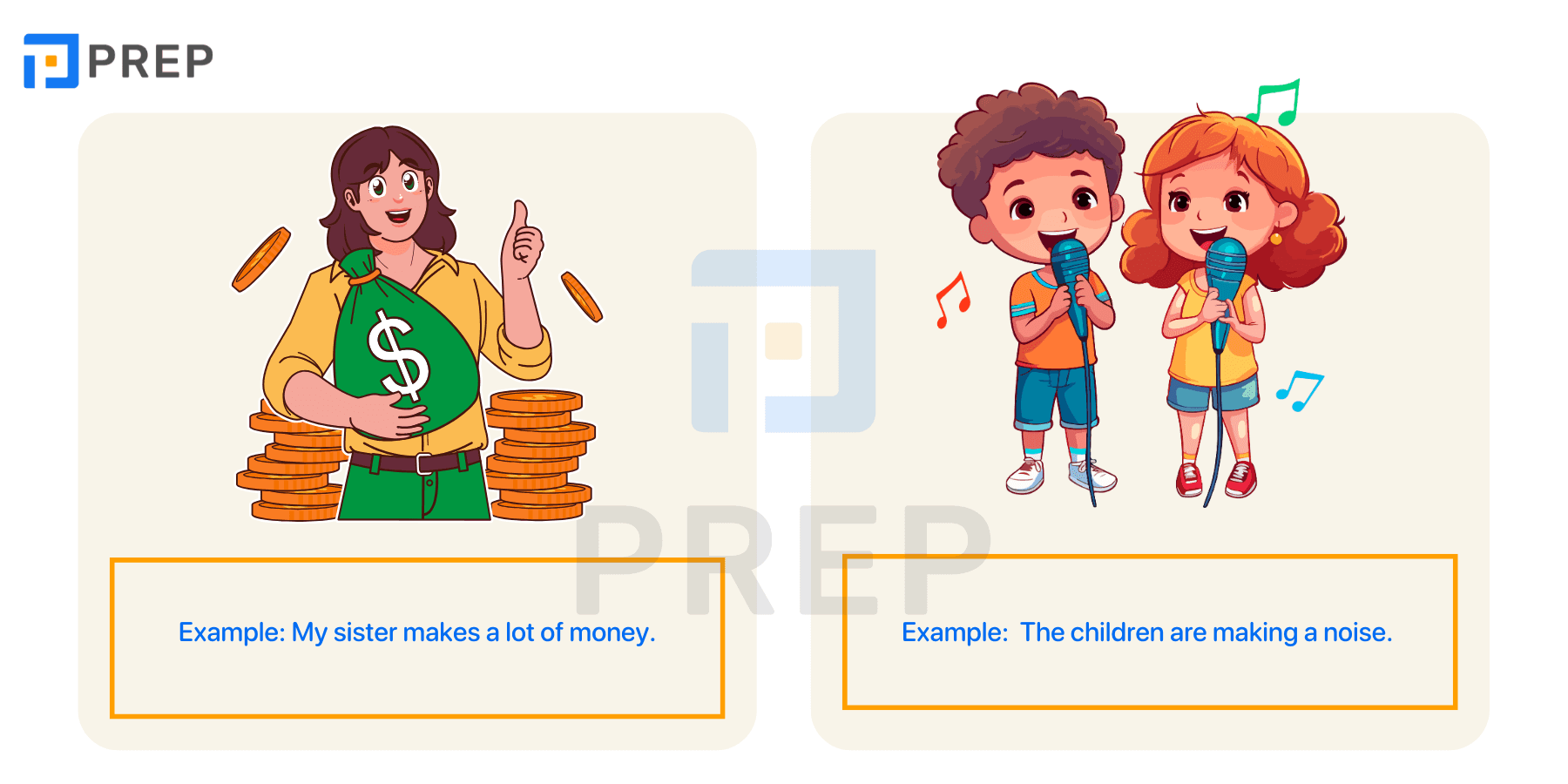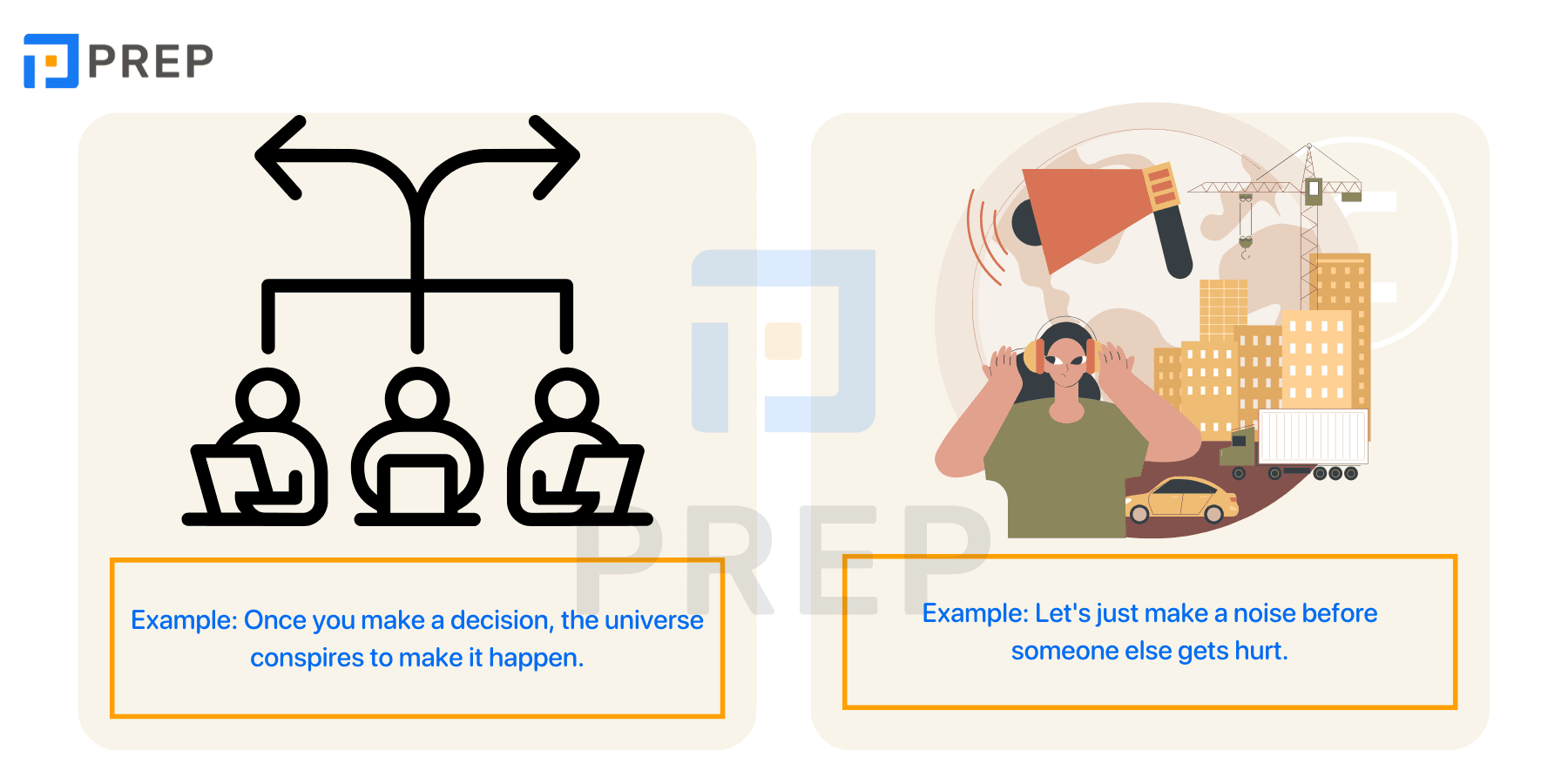What is Make in English? Common phrases with Make in English
Make is a commonly used verb in English, frequently appearing in everyday conversations as well as in real English exams. Therefore, mastering Make in English and the phrases associated with it will help you effectively enhance your knowledge and confidently achieve high scores in upcoming tests!
- I. What is Make in English?
- II. Common structures with Make in English grammar
- 1. Make + object
- 2. Make + object (o) + adjective complement (ac)
- 3. Make + object (o) + noun complement (nc)
- 4. Make + indirect object (io) + direct object (do)
- 5. Make + object (o) + prepositional phrase (pp) with for
- 6. Make + object + adjective (or noun) complement + prepositional phrase with for
- 7. Make with meaning: force someone to do something
- 8. Make possible
- III. Common phrasal verbs and collocations with Make in English grammar
- IV. Distinguishing between Make and Do
- V. Exercises on Make in English

I. What is Make in English?
Make has the phonetic transcription /meɪk/ and functions as a verb, both as an intransitive and transitive verb with different meanings. The Make in English meanings are:
-
Make acts as a verb:
-
To earn or get. For example: My sister makes a lot of money.
-
To produce something, often using a particular substance or material. For example: The children are making a noise.
-
To force someone or something to do something. For example: My teacher makes students repeat this word.
-
To cause something. For example: John makes his girlfriend happy.
-
To perform an action. For example:My wife is making the dinner.
-

Make synonyms in English:
|
Make synonyms in English |
Example |
|
Produce /prəˈdjuːs/ |
The factory produces cars for export to other countries. |
|
Create /kriˈeɪt/ |
The artist created a stunning sculpture out of marble. |
|
Invent /ɪnˈvɛnt/ |
Thomas Edison invented the light bulb. |
|
Develop /dɪˈvɛləp/ |
The company is developing a new software application for smartphones. |
|
Manufacture /ˌmænjuˈfæktʃər/ |
This company manufactures electronics components for computers. |
|
Build /bɪld/ |
They built a new office building downtown. |
|
Construct /kənˈstrʌkt/ |
The engineers constructed a bridge over the river. |
II. Common structures with Make in English grammar
Below, we will examine some of the most common and widely used structures with the verb 'Make' in English grammar, providing a deeper understanding of how to apply this versatile verb in various contexts.
1. Make + object
-
She made some coffee.
-
Did you really make this table?
Here are some phrases about Make + object:
|
make a claim |
|
make a complaint |
|
make a concession |
|
make a date |
|
make a difference |
|
make a fuss |
|
make a list |
|
make a mess |
|
make a mistake |
|
make a note |
|
make a phone call |
|
make a point |
|
make a profit/loss |
|
make a sound |
|
make a speech |
|
make a start |
|
make a statement |
|
make a wish |
|
make an appointment |
|
make an effort |
2. Make + object (o) + adjective complement (ac)
-
Music makes me happy.
-
Jame makes me sad.
3. Make + object (o) + noun complement (nc)
-
They made her team captain for the coming year.
-
I promise you we’re going to make it a priority.
4. Make + indirect object (io) + direct object (do)
-
The chef made him a special cake.
-
Can I make you a cup of tea or coffee?
5. Make + object (o) + prepositional phrase (pp) with for
-
Can you make a sandwich for Lisa as well?
-
I’ve made an appointment for you at the dentist’s.
6. Make + object + adjective (or noun) complement + prepositional phrase with for
-
He made life difficult for me.
-
What would make it a better book for students?
7. Make with meaning: force someone to do something
-
The boss made me work an extra day.
-
The people were made to wait outside while the committee reached its decision.
8. Make possible
|
Structure |
Example |
|
Make it possible/ impossible (for sb) + to V |
The new car makes it possible to go to work easily and quickly. |
|
Make possible/ impossible + N/Noun phrase |
Nowadays, the Internet makes possible much faster communication. |
III. Common phrasal verbs and collocations with Make in English grammar
Here are some phrasal verbs and idioms with Make in English that are frequently used in communication and English exams!
1. Phrasal verbs with Make in English grammar
|
Phrasal verbs with Make in English |
Meaning |
Example |
|
Make off |
to leave quickly, usually in order to escape |
The lawbreakers made off before the police arrived. |
|
Make up for |
to take the place of something lost or damaged or to compensate for something bad with something good |
My friend bought her team leader dinner to make up for being so late the day before. |
|
Make up |
to put make-up on someone's face, to improve or change its appearance |
My girlfriend makes herself up every day. |
|
Make out |
to see, hear, or understand something or someone with difficulty |
Because my younger sister spoke so quietly, his friend could hardly make out what she was saying. |
|
Make for |
to go in the direction of a place or thing |
Her grandmother picked up her umbrella and made for the door. |
|
Make sth out to be |
to claim, usually falsely, that something is true: |
She makes herself out to be an important singer but her songs are utter garbage. |
|
Make over |
to improve something or someone by working on or changing various parts |
My boyfriend’s team has been chosen to make over the losing volleyball one. |

2. Collocations with Make in English
|
Collocations with Make in English |
Example |
|
Make a difference |
This scholarship of my school fund had made a difference in a lot of people’s lives. |
|
Make a decision |
Once you make a decision, the universe conspires to make it happen. |
|
Make a promise |
My father made a promise to help me. |
|
Make an effort |
If they could all make an effort to keep this kitchen room tidier it would help. |
|
Make a complaint |
My sister will make a complaint over the phone or by email. |
|
Make a noise |
Let's just make a noise before someone else gets hurt. |
|
Make money |
Making money is the only reason homeless people work on Wall Street. |

IV. Distinguishing between Make and Do
To gain a clearer understanding of how to use 'Make' in English, it is important to distinguish between 'Make' and 'Do' and explore their differences.
|
Do |
Make |
|
|
V. Exercises on Make in English
Practice the following exercises to accurately understand how to use Make in English!
1. Exercise
Exercise 1: Fill in the blanks with the correct form of the verb in parentheses.
-
When my older sister cooks, she always……………..(do/ make) a mess in my kitchen!
-
My sister always……………..(do/ make) her homework before she goes out.
-
You have to……………..(do/ make) an effort to learn Korean!
-
Then he will……………..(do/ make) progress!
-
He……………..(do/ make) a lot of things in his free time.
Exercise 2: Fill in the blanks with Do or Make.
-
……………..(do/ make) a lot of damage.
-
……………..(do/ make) an impression.
-
……………..(do/ make) the shopping and the washing-up.
-
……………..(do/ make) one’s teeth.
-
……………..(do/ make) an announcement.
2. Answer
|
Exercise 1 |
Exercise 2 |
|
|
Throughout this article, PREP has provided an overview of the concepts, uses, phrasal verbs, and collocations associated with the verb 'Make' in English. We hope this guide aids your exam preparation and helps you achieve high scores in your English tests.

Hi I'm Chloe, and I am currently serving as an Product Content Administrator at Prep Education. With over five years of experience in independent online IELTS study and exam preparation, I am confident in my ability to support learners in achieving their highest possible scores.
Comment
Premium content
View allPersonalized roadmap
Most read












